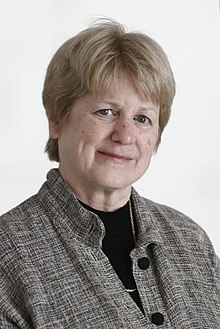Mary-Claire King
Mary-Claire King (born February 27, 1946 in Evanston, Illinois ) is an American geneticist . She is known for discovering the breast cancer genes and comparing the genetic makeup of chimpanzees and humans. She also made a name for herself in forensic genetics.
Live and act
King first studied mathematics at Carleton College (Bachelor in 1966) and then genetics at the University of California, Berkeley , where she received her PhD in 1973 from Allan Wilson . In her dissertation, she showed that the genetic material of chimpanzees and humans is 99 percent identical, which was surprising at the time. From 1974 she was an Assistant Professor at the University of California, San Francisco , and then in 1976 Assistant Professor and 1980 Associate Professor of Genetics and Epidemiology at Berkeley. Since 1995 she has been a professor at the University of Washington (American Cancer Society Research Professor).
King and colleagues showed in 1990 that a single gene, BRCA1 on chromosome 17, was responsible for many breast and ovarian cancers. About 5-10% of breast cancers are genetic and about half have mutations in BRCA1 or 2. This discovery also changed the role of genetics in medicine beyond the study of rare hereditary diseases, because, contrary to expectations, a single gene played an essential role in a common disease, usually attributed to many factors (genetic and environmental). In the race to clone the BRCA1 gene, she was beaten by Mark Skolnick's group at the University of Utah . Later she was involved in researching the role of the BRCA2 gene. She also looked for genes for other diseases, such as genetic deafness, working with Israeli scientists (genetic deafness is common among Arabs in Palestine).
She was involved in the Human Genome Diversity Project and interested in genetic research into human history.
King is active in forensic genetics for human rights organizations, first in 1984 in Argentina on behalf of the grandmothers of the Plaza de Mayo ( Abuelas de la Plaza de Mayo ) for victims of the military regime for whom she identified children abducted by the regime. She used to mitochondrial DNA and genes for leukocyte - serotypes from the teeth. It has been shown that teeth are a good way to take samples from victims for a successful DNA analysis of their interiors under laboratory conditions . King subsequently worked with her laboratory for Amnesty International , the UN war crimes tribunal and also for the US Army, for example on cases in the Balkans, Rwanda and El Salvador .
King was politically active from an early age. She took part in anti-Vietnam War protests in college, taught as a visiting professor during the military coup in Santiago de Chile, and studied the effects of pesticides on farm workers for Ralph Nader during her student days .
She married in 1973, is divorced and has one daughter.
Awards and memberships
In 2006 King received the AH Heineken Prize for Medicine . She has multiple honorary doctorates (including Harvard University , Leuven, Dartmouth College ). She has been a member of the National Academy of Sciences since 2005 , she is a member of the American Association for the Advancement of Science and the Institute of Medicine. She received the Clowes Award for Basic Research from the American Association for Cancer Research (1994) and the Jill Rose Award from the Breast Cancer Research Foundation. In 1999 she was elected to the American Academy of Arts and Sciences and in 2012 to the American Philosophical Society . In 2006 she received the Weizmann Woman and Science Award and the Gruber Prize for Genetics , and in 2010 the Pearl Meister Greengard Prize . In 2013 she received the Paul Ehrlich and Ludwig Darmstaedter Prize , and in 2014 the Lasker ~ Koshland Special Achievement Award in Medical Science . In 2016 she was awarded the National Medal of Science and the Szent-Györgyi Prize . In 2018 she received the Dan David Prize , the Shaw Prize in Medicine, the Prince Mahidol Prize and the Benjamin Franklin Medal of the American Philosophical Society. For 2020, King was awarded the William Allan Award from the American Society of Human Genetics .
Fonts
- PL Welsch, K. Owens, M.-C. King: Insights into the function of BRCA1 and BRCA2. In: Trends in Genetics . Volume 16, 2000, pp. 69-74.
- P. Welsch, M.-C. King: BRCA1 and BRCA2 and the genetics of breast and ovarian cancer. In: Hum. Mol. Genet. Volume 10, 2001, pp. 705-713.
Web links
- Website of your laboratory
- King on the work of her laboratory
- Page to King at the University of Washington
Individual evidence
- ↑ Protein polymorphisms in chimpanzee and human evolution
- ↑ The molecular biology department was expanded considerably in the early 1990s thanks to donations from Microsoft founder Bill Gates .
- ↑ JM Hall, MK Lee, B. Newman, JE Morrow, LA Anderson, B. Huey, MC King: Linkage of early-onset familial breast cancer to chromosome 17q21. In: Science . Volume 250, 1990, pp. 1684-1689.
- ↑ KM Owens, M.-C. King: Genomic views of human history. Science, Vol. 286, 1999, pp. 451-453, abstract
- ↑ S. Gebhard: DNA-analytical investigations on fresh and stored teeth. Dissertation. 2009.
- ^ Member History: Mary-Claire King. American Philosophical Society, accessed October 24, 2018 (with biographical information).
| personal data | |
|---|---|
| SURNAME | King, Mary-Claire |
| BRIEF DESCRIPTION | American geneticist |
| DATE OF BIRTH | February 27, 1946 |
| PLACE OF BIRTH | Illinois Evanston |
